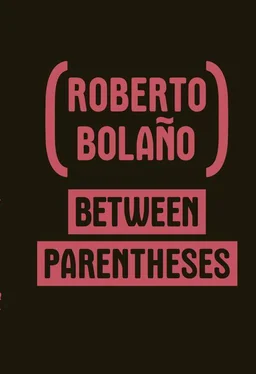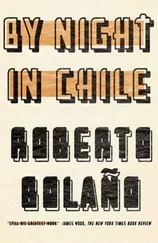Roberto Bolaño - Between Parentheses - Essays, Articles and Speeches, 1998-2003
Здесь есть возможность читать онлайн «Roberto Bolaño - Between Parentheses - Essays, Articles and Speeches, 1998-2003» весь текст электронной книги совершенно бесплатно (целиком полную версию без сокращений). В некоторых случаях можно слушать аудио, скачать через торрент в формате fb2 и присутствует краткое содержание. Год выпуска: 2011, Издательство: New Directions, Жанр: Публицистика, Критика, на английском языке. Описание произведения, (предисловие) а так же отзывы посетителей доступны на портале библиотеки ЛибКат.
- Название:Between Parentheses: Essays, Articles and Speeches, 1998-2003
- Автор:
- Издательство:New Directions
- Жанр:
- Год:2011
- ISBN:нет данных
- Рейтинг книги:4 / 5. Голосов: 1
-
Избранное:Добавить в избранное
- Отзывы:
-
Ваша оценка:
- 80
- 1
- 2
- 3
- 4
- 5
Between Parentheses: Essays, Articles and Speeches, 1998-2003: краткое содержание, описание и аннотация
Предлагаем к чтению аннотацию, описание, краткое содержание или предисловие (зависит от того, что написал сам автор книги «Between Parentheses: Essays, Articles and Speeches, 1998-2003»). Если вы не нашли необходимую информацию о книге — напишите в комментариях, мы постараемся отыскать её.
The Savage Detectives
Between Parenthese
Between Parentheses: Essays, Articles and Speeches, 1998-2003 — читать онлайн бесплатно полную книгу (весь текст) целиком
Ниже представлен текст книги, разбитый по страницам. Система сохранения места последней прочитанной страницы, позволяет с удобством читать онлайн бесплатно книгу «Between Parentheses: Essays, Articles and Speeches, 1998-2003», без необходимости каждый раз заново искать на чём Вы остановились. Поставьте закладку, и сможете в любой момент перейти на страницу, на которой закончили чтение.
Интервал:
Закладка:
Chilean Poetry Under Inclement Skies
The picture I have of Chilean poetry is like my memory of my first dog, Duke, a mongrel who was part St. Bernard, German shepherd, and Alsatian. He lived with us for many years, and when I was lonely he was like father, mother, teacher, and brother all in one. To me, Duke is Chilean poetry and I have the vague suspicion that Chileans see Chilean poetry as a dog, or as dogs in their various incarnations: sometimes as a savage pack of wolves, sometimes as a solitary howl heard between dreams, and sometimes — especially — as a lap dog at the groomer’s. I think of Neruda, Gabriela Mistral, Huidobro, Parra, de Rokha, but I also think of Pezoa Véliz and his poem about the hospital, a poem that deserves a place in the annals of Latin American melancholy, and about the songs of Violeta Parra — straight out of the repertoire of Archaic Greece — that speak unflaggingly of the tragedy of Latin America.
So it is for us Chileans: this seems to be our fate and our particular splendor. And that’s how I think of Lihn, as an undeserved luxury, who throughout his work tried to teach us to avoid melodrama, and that’s how I think of Teillier, who retreated to one of Santiago’s most miserable neighborhoods to die, accepting his fate as a poet and alcoholic. After Lihn and Teillier, nothingness or mystery offers us its little paw and even wags its tail. Zurita creates a wonderful body of work that marks a point of no return for the poetics of the previous generation and for which he stands out among his generation, but his eschatology and his messianism are also the pillars of a mausoleum or a funeral pyre toward which almost all the poets of Chile marched in the 1980s. That dolce stil novo tried to be fresh and epic, and in some ways it was, though its fringes were bitter and pathetic.
The poetry of Gonzalo Millán, as consistent and lucid as anything on the Chilean and even the Latin American scene, has stood for some years as the only secular poetry in the face of an avalanche of sacramental verse: it’s a relief to read Millán, who doesn’t present himself as the voice of the nation or of the oppressed. Juan Luis Martínez makes a fleeting study of Duchamp (the perfect study, in a way) and disappears. Rodrigo Lira blazes a path and is lost. But one must reread Lira. Instead of trying to be Dante, he tries to be the cartoon bird Condorito. Instead of trying to gain entrance to the House of Handouts (which for so long was the House of Poets), he tries to gain entrance to the House of Destruction. Diego Maquieira writes just two brilliant books, and then opts for silence. What, I ask myself sometimes, was Maquieira trying to tell us? Did he wag his tail, did he growl, did Chilean poetry toss him a little stick to fetch and he never came back? With Maquieira anything is possible, good or bad. And yet the ultimate rebel of my generation is Pedro Lemebel, who writes no poetry but whose life serves as an example for poets. In Lemebel there’s tenderness, a sense of the apocalypse, fierce bitterness. With him there are no half measures; to read him requires deep immersion.
Chilean poetry is a dog and now it lives out under inclement skies again. Bertoni, who gathers seaweed on the coast, is the perfect example.
On Bruno Montané
His poems are brushstrokes suspended in the air. Sometimes they’re only jottings, other times miniatures, occasionally long existentialist works shrunk to eight or twelve lines. His poems are blood suspended in the air. His intent, or his attitude toward the world and culture, vacillates between irreconcilable poles. From this prolonged struggle he has been able to extract paradoxical verses. He writes like a naturalist who believes in very little and who nevertheless continues to stubbornly do his work, his stubbornness at times confused with indifference. I believe that he’s one of Chile’s best contemporary poets.
Eight Seconds With Nicanor Parra
There’s only one thing I can say for sure about Nicanor Parra’s poetry in this new century: it will endure. This means very little, of course, as Parra would be the first to acknowledge. Still, it will endure, along with the poetry of Borges, Vallejo, Cernuda and a few others. But this, it must be said, hardly matters.
Parra’s wager, his probe into the future, is too complex to be explained here. And it’s too dark. It possesses the darkness of motion. The actor who speaks or gestures, however, is perfectly visible. His features, his trappings, the symbols that accompany him like tumors are familiar: he’s the poet who sleeps sitting in a chair, the beau who gets lost in a cemetery, the lecturer who tears at his hair until he pulls it out, the brave man who dares to piss kneeling, the hermit who watches the years go by, the anguished statistician. In order to read Parra, it’s worth asking the question that he asks himself and that Wittgenstein asks us: is this hand a hand or isn’t it a hand? (The question should be asked as one gazes at one’s own hand.)
I wonder who will write the book that Parra planned and never wrote: a history of World War II told or sung battle by battle, concentration camp by concentration camp, exhaustively, a poem that somehow became the instant antithesis of Neruda’s Canto general and of which Parra retains only one text, the Manifiesto , in which he expounds upon his poetic credo, a credo that Parra himself has ignored whenever necessary, among other things because that’s exactly what credos are for: to give a vague sense of the unexplored territory into which one is heading, and — infrequently — to single out the real writers. When it comes to concrete risks and dangers, credos aren’t worth much.
Let the brave follow Parra. Only the young are brave, only the young are pure of heart among the pure. But Parra doesn’t write juvenile verse. Parra doesn’t write about purity. He does write about pain and loneliness; about pointless and necessary challenges; about words fated to drift apart just as the tribe is fated to drift apart. Parra writes as if the next day he’ll be electrocuted. As far as I know, the Mexican poet Mario Santiago was the only one with a clear understanding of his work. The rest of us have just glimpsed a dark meteor. First requirement of a masterpiece: to pass unnoticed.
There are moments in the journey of a poet when he has no choice but to improvise. He may be able to recite Gonzalo de Berceo from memory and he may have expert knowledge of Garcilaso’s heptasyllables and hendecasyllables, but there are moments when all he can do is throw himself into the abyss or stand naked before a clan of ostensibly polite Chileans. Naturally, one has to know how to accept the consequences. First requirement of a masterpiece: to pass unnoticed.
A political note: Parra has managed to survive. It’s not much, but it’s something. He has survived the Chilean left, with its deeply right-wing convictions, and the memory-challenged, neo-Nazi Chilean right. He has survived the neo-Stalinist Latin American left and the Latin American right, now globalized and until recently the silent accomplice of repression and genocide. He has survived the mediocre Latin American professors who swarm on American university campuses and the zombies who stagger through the village of Santiago. He has even survived his own followers. And I would go further — probably carried away by enthusiasm — and say that Parra, along with his comrades (Violeta at the head) and his Rabelaisian forefathers, has achieved one of poetry’s greatest goals of all time: to wear out the public’s patience.
Lines picked at random: “It’s a mistake to think the stars can help cure cancer,” said Parra. Right he is. “Apropos of nothing, I remind you that the soul is immortal,” said Parra. Right again. And we could go on like this until the room was empty. I remind you, nevertheless, that Parra is a sculptor too. Or a visual artist. These explanations are perfectly useless. Parra is also a literary critic. He once summed up the entire history of Chilean literature in three lines: “The four great poets of Chile / are three: / Alonso de Ercilla and Rubén Darío.”
Читать дальшеИнтервал:
Закладка:
Похожие книги на «Between Parentheses: Essays, Articles and Speeches, 1998-2003»
Представляем Вашему вниманию похожие книги на «Between Parentheses: Essays, Articles and Speeches, 1998-2003» списком для выбора. Мы отобрали схожую по названию и смыслу литературу в надежде предоставить читателям больше вариантов отыскать новые, интересные, ещё непрочитанные произведения.
Обсуждение, отзывы о книге «Between Parentheses: Essays, Articles and Speeches, 1998-2003» и просто собственные мнения читателей. Оставьте ваши комментарии, напишите, что Вы думаете о произведении, его смысле или главных героях. Укажите что конкретно понравилось, а что нет, и почему Вы так считаете.












